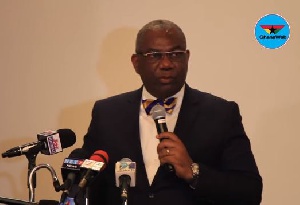The concession agreement between the government of Ghana and a consortium of investors, led by Manila Electric Company (Meralco), for private sector participation (PSP) in the Electricity Company of Ghana (ECG) is to take off fully by February, 2019.
“By January 25, 2019, all parties must fulfil all their conditions precedent to transferring the operations and February 1, 2019, is the expected transfer date when the concessionaire takes over operations of ECG,” Energy Minister Boakye Agyarko said while addressing the media after the agreement was laid on the Floor of Parliament for ratification on Tuesday.
The Energy Minister – acting on behalf of government, and officials of Meralco are expected to sign the Memorandum of Understanding (MoU) by July 26, 2018; which will enable the transaction to become effective by August 2, 2018.
According to Mr. Agyarko, a draft of the negotiation agreement has been completed and approved by Cabinet. The document has since been submitted to Parliament for ratification.
On becoming effective, the second tranche of US$192m funding will be released to ECG to tackle very critical and important infrastructural development.
The Speaker of Parliament, Prof. Mike Oquaye, has referred the concession agreement to the Mines and Energy Committee of the House for consideration and report.
For Mr. Agyarko, when the energy sector reforms were mooted in 1995 this was the direction sought to take the country. “Had we been bold to take that path in 1995, my prediction is that the concession period would have been over by [2015] and ECG would have been in a far better place than now; and the supply of electricity to our consumers and citizens would have been in a much better, more stable condition than present.”
Details of the agreement before Parliament
Among components in the concession agreement or memorandum laid before Parliament is that all ECG workers transferred to the concessionaire are expected to keep their jobs and the collective bargaining agreement.
Also, the period of the concession will be reduced from 25 years to 20 years. More importantly, the Ghanaian participation component will be increased from 20 percent to 51 percent.
“These are the enhancements that we made to the concessionaire, and I would argue that we are better for them; the arrangement will certainly accrue to the benefit of Ghanaians.”
Mr. Agyarko revealed that under this agreement the private partner will invest some US$580million into the distribution system during the first five years, while the US government also invests US$498million.
Tariffs are also expected to be set by the Public Utility Regulatory Commission (PURC) and not the concessionaire, so as to be kept affordable for citizens.
Concessionaire to operate under new name
He also disclosed that the brand ECG will remain a government entity but the concessionaire has decided to adopt a new name: Power Distribution Services Ghana Limited.
“The operation side of the concession will be Power Distribution Services Ghana Limited; ECG reformed or shrunk down or whatever will still be ECG; they own the trademark,” he explained.
Background
Government in its quest to restructure and streamline the operations of the power distributor, ECG, disclosed that it is going to allow private sector participation to allow the national power distributor make profit and provide quality service to its clients.
Ghana signed the Power Compact with the United States of America acting through the
Millennium Challenge Corporation (MCC), an independent United States government agency, on the sidelines of the US Africa Leaders’ Summit in Washington DC on August 5, 2014.
Under the Power Compact, six projects will be implemented to address the root causes of power unavailability and unreliability in Ghana
The project includes: ECG Financial and Operational Turnaround Project; NEDCo Financial and Operational Turnaround Project; Regulatory Strengthening and Capacity Building Project; and Access Project.
The rest are Power Generation Sector Improvement Project; and Energy Efficiency and Demand Side Management Project.
Business News of Thursday, 12 July 2018
Source: thebftonline.com













